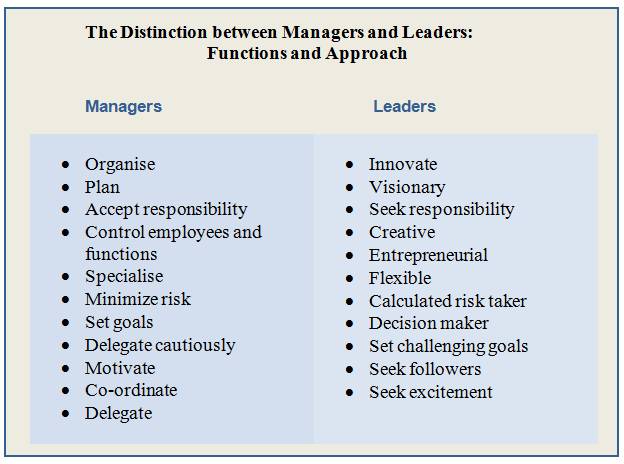Difference between leadership and management

The terms leadership and management, like many business terms, are often used interchangeably and in many cases this is unimportant as the terms have clear overlaps. However, there is an important difference between managers and leaders. A manager may be a leader, or a leader may be a manager, but a manager is not necessarily a leader and a leader is not necessarily a manager! Leadership is a specific and difficult task.
Warren Bennis attributes at least 15% of a firm's success directly to its leader, but clearly this leaves the other 85% attributable to other factors - one of which is the quality of the management. Management, like leadership is difficult to define and categorise, which has left the field open for millions of books on the subject. In this section, we will examine some of the more seminal research on the subject. However, as a starting point, we will explore some general differences between the two terms:
The Role of the Manager

Good management consists in showing average people how to do the work of superior people.
John D. Rockefeller
Management's function is the effective and efficient deployment of the resources of the firm. A manager is someone who, as a result of appointment to a particular role or position, has legitimate power to carry out that function. Great managers tend to have one thing in common: they possess the ability to turn employee skills and talents into improved performance and the satisfaction of organisational goals. The essence of management is delivering excellent quality and customer service. However, these are measures of management success and outcomes; the real focus of management is transforming employee skills and talents to deliver these outcomes. The coaching instinct is, therefore, a core skill of good managers.
It can be argued that management is more about tactical decisions in an organisation, leaving the vision and strategy to the leader. Management is mostly about processes. Managers establish and/or follow rules and procedures and follow the culture of the organization. This is a simple way to see how leadership is different to management:
The Role of the Leader

Good leaders make people feel that they're at the very heart of things, not at the periphery. Everyone feels that he or she makes a difference to the success of the organization
Warren G. Bennis
Leaders need to win the hearts and minds of their followers to ensure that their vision of the future is understood and followed by everyone. Leadership is mostly about behaviour. It is particularly important at significant change points in the firm's development. When the business is young the founder needs to provide the vision for the organisation and to drive this forward. When large organisations change, leaders need to re-energise the workforce, refocus the vision and set the new strategic direction of the business.
At the core of leadership is an ability to cut through individual differences and focus on common needs. Leadership relies most strongly on less tangible and less measurable things like trust, inspiration, attitude, decision-making, and personal character. Unlike managers, leaders are instigators of change, so they are risk-takers and decision makers. They:
- Identify the fundamental elements of an organisation; who it serves and its core strengths
- Set the strategic direction of the organisation
- Are optimistic, innovative, entrepreneurial and creative
Leadership is centrally concerned with people. The leader focuses on the future and rallies others to this vision. Of course leadership involves decisions and actions relating to all sorts of other things, but leadership is special compared to any other role because of its unique responsibility for people.
Summary

